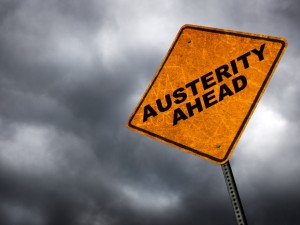 Greece just got bailed out again, in exchange for further austerity measures. Closer to home, I just read tonight that the City of Astoria is considering eliminating some street lighting to save money. Of course Clatsop Community College recently announced the elimination of 15 full-time positions, which have been whittled down to 5 by various means. Nevertheless, the college (and K-12 education) will have to do with less for a long time, as the state legislature just doesn’t have the money anymore to fund education at anywhere near the levels of pre-2008. Since the crash of the financial system in that year, many local, state and federal governments across the globe have instituted austerity measures to cope with the loss of revenues brought on by the contraction of the private economy.
Greece just got bailed out again, in exchange for further austerity measures. Closer to home, I just read tonight that the City of Astoria is considering eliminating some street lighting to save money. Of course Clatsop Community College recently announced the elimination of 15 full-time positions, which have been whittled down to 5 by various means. Nevertheless, the college (and K-12 education) will have to do with less for a long time, as the state legislature just doesn’t have the money anymore to fund education at anywhere near the levels of pre-2008. Since the crash of the financial system in that year, many local, state and federal governments across the globe have instituted austerity measures to cope with the loss of revenues brought on by the contraction of the private economy.
In a return to Reagan/Thatcher-era policy, national governments have opted to reduce costs instead of obtaining more revenue via taxes on the more fortunate. The option of borrowing money has been largely shut down by the squeeze on credit and the reluctance of populations to add to already staggering debt loads. So the services that governments supply have just been reduced, drastically.
Progressives, led by the Occupy movement, have decried the various austerity programs, claiming that while the 99% suffer, the 1% are just getting richer. It didn’t work during the Reagan years, nor is it working now, progressives say, and largely, they’re right. The sudden loss of so many essential services (i.e. education, public health and safety, and environmental protection) is putting not only the human population at risk, but entire ecosystems, and, due to global problems such as climate change and species loss, perhaps the entire planet.
At the same time as these services are being cut, we’re being asked (and sometimes told) to spend more money on retail purchases “to keep the economy going”. And examples of exorbitant spending by ridiculously rich individuals and corporations, such as funding the so-called “Super PACs” that are helping the U.S. presidential candidates to spend astronomical amounts of money, abound. Austerity is not to be practiced by individuals, just governments. We should spend as much as possible, on everything EXCEPT government (i.e. taxes).
My father was a Calvinist Jew, uniting the philosophies of these two groups into the practice of working himself to death, while spending as little as possible on himself. Due to the failure of a business he started, and the inability to find a good job after that, he was unable to provide for our tertiary education, and my mother is now working two jobs in her mid-70s to pay the rent. But you know, I’ve inherited some of the Calvinist Jewishness of my dad, and I’m not so sure it’s that bad a trait.
We have one car (a 2004 Prius), a vintage 1989 stereo system, and most of my clothes are from thrift stores. It really is a process for me to spend money; I often spend months or even years deciding to buy a big-ticket item. I can’t relate to the big spenders – my favorite story about this is when I was asked by an Aussie TV crew when I was in Brisbane what I would do if I won the lottery there, and I told them I’d buy land to conserve it. What about cars, clothes, houses, they asked. I repeated my answer, and they moved on. I didn’t get on TV, and I didn’t win anyway.
Environmentalists, myself included, espouse this philosophy of austerity. We advocate for less development, less mining, less use of energy, less kids, less stuff. We tout the “live within your means” mantra, and are constantly fighting the actions of people and businesses that are determined to provide more and more stuff, despite any damage to the environment. For us, austerity is a virtue, and it puts us in direct conflict with the dominant philosophy of economic growth.
I think our culture needs to be more austere in so many ways, mirroring the economic austerity measures being taken by governments the world over. Call it cultural austerity, or institutionalization of those values of my father, or environmentalists, that would allow us to live with so much less, and share what we have with so many more people and other earthly creatures.
Jesus said it best, “The meek shall inherit the earth.” Let’s take Jesus’ words to heart, and all live with more austerity, so that more can live, with dignity. The alternative is surely devastation, as we seek to extract more and more of the crust of the Earth, and distribute wealth in ever-increasing disparity.
I think you are right to point out the flip-side of austerity. Conservatives and conservationists should be equally focused on conserving natural resources and tax dollars. There’s a good message in there somewhere for the Lenten season.
I realized after I started writing the next post that it was fortuitous that I wrote this piece on Ash Wednesday.